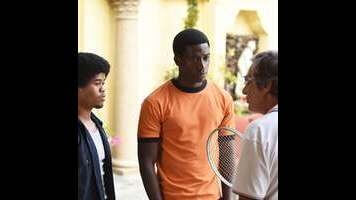For anyone who’s stuck with Snowfall through its first three episodes, the show’s flaws are readily apparent. What those first three episodes did well, though, was mask, or at least significantly distract from, the failings. By chiefly focusing on Franklin’s story, and delivering quite a bit of consequential action, where we could witness the consequences of Franklins’ decisions, Snowfall was able to deliver three straight episodes that, while not exactly bold or unique, were certainly compelling. The problem with masking flaws, though, is that, as the season rolls on, the issues become more apparent. You can only rely on shock and action for so long; eventually, you have to offer up something more meditative in order to deepen the psychology of the characters and move the plot in new directions. “Trauma” is that meditative episode, but rather than adding layers to the story, it exposes the persistent struggles of Snowfall so far this season.
Essentially, “Trauma” picks up in the immediate aftermath of some very big decisions. Franklin, newly equipped with a gun, is ready to go find Karvel and get his money back. Teddy finds his way into the jungle in order to repair his relationship with Alejandro and protect the CIA’s interests in the guerrillas’ fight against communism. Then there’s the episode’s opening scene, which is stunning. The camera offers us an “inside the trunk” perspective, looking out as Gustavo, Lucia, and Pedro take in the work they’ve completed. The previous episode left us with a cliffhanger, as the three were about to descend on Enrique in order to kill him and frame him for the inter-cartel robbery. The cold open is wonderfully subversive, removing us from the action and only allowing us to witness the aftermath. We see Lucia is bloody, Gustavo is calm, and Pedro, with a Los Angeles Lakers hoodie pulled over his head, looks shaken. It’s a quiet, cold scene that doesn’t tell us exactly what happened at Enrique’s, but does give us tremendous insight into where these characters stand on an emotional level.
Ideally, “Trauma” would use that opening scene as inspiration for how to structure the rest of the episode, as everyone here is dealing with the fallout of their actions. Unfortunately, it doesn’t manage to follow through, instead rolling out two very dull stories, one with Franklin and Leon chasing down Karvel, and one with Teddy encountering some harsh realities in the jungle. I mentioned in last week’s review that the Teddy storyline is a mess, lacking the kind of nuance and attention to detail that seems necessary when exploring complex geopolitical struggles, and that’s once again true here. Nods to the where and when of Teddy’s operation are peppered throughout the episode—there’s mentions of cities in Peru and Colombia, we meet Alejandro’s wife, and begin to unpack how the cocaine supply is moved around—but it’s still a frustratingly vague story.
On top of that, “Trauma” attempts to keep with its theme of contemplating the cost of certain actions by having Teddy encounter a young boy when he arrives at camp. He takes to the kid, talking baseball with him and doing his best to get the boy to open up about his deceased father. The moral twist comes when Teddy reveals he discovered an infrared device up in the tree where the kid was scouting for intruders, saying that it can be used by the Sandinistas to locate the camp. He pegs the kid as working for the Sandinistas, sending the boy to his death. It’s meant to be a moment where Teddy reckons with the toll of this war, and yet it falls flat. It feels rushed and manipulative; “Trauma” removes all the complexity of the CIA’s attempts to fight communism and instead opts to tell a reductive story about a white man vaguely lamenting the consequences of his actions.
The thing is, “Trauma” is really only hinting at a moral reckoning for every character. Surprisingly, Pedro gets the most insightful character work here, his inability to kill Enrique when he was choking out Lucia causing him to question everything he’s ever said about himself. He’s a man with an identity crisis, threatened not only by Gustavo’s presence but also his own failures. Seeing Pedro lash out and fall apart is the episode’s lone bit of meaningful character work. Outside of that, nobody else is really forced to deal with the destruction they’ve wrought.
Sure, there’s something potentially interesting in the fact that Franklin hunts down Karvel but ultimately ends up letting Leon be the trigger man for the kill, because at some point Franklin will have to reckon with the fact that he’s caused all of this. But that’s not happening yet, and the lack of conflict contributes to the already frustrating fact that Franklin seems so untouchable. On top of that, he just walks away from Avi and the coke-dealing business. That might not be the end of Franklin’s dealings with him, but it’s a frustrating single-episode redemption arc. Franklin got shook, and now he’s out. That’s too easy; unfortunately, reductive and simplistic storytelling is the hallmark of “Trauma.”
Stray observations
- I love that Avi calls Karvel “ice cream cake boy,” and glad that Snowfall found a way to get that joke in there.
- “How is a goose patient?” Franklin wants none of Leon’s made-up analogies.
- So, Gustavo has plans for his future: to update his gym with new equipment and make it a place for all sorts of boxers and wrestlers. He has a dream. It’s nice to get a little more backstory and motivation with that character.
- Avi’s advice to Franklin when it comes to being a big-time player in this game: “You should invest in your own shovel if you’re in it for the long haul.”



![HBO teases new Euphoria, Larry David, and much more in 2026 sizzle reel [Updated]](https://img.pastemagazine.com/wp-content/avuploads/2025/12/12100344/MixCollage-12-Dec-2025-09-56-AM-9137.jpg)





































